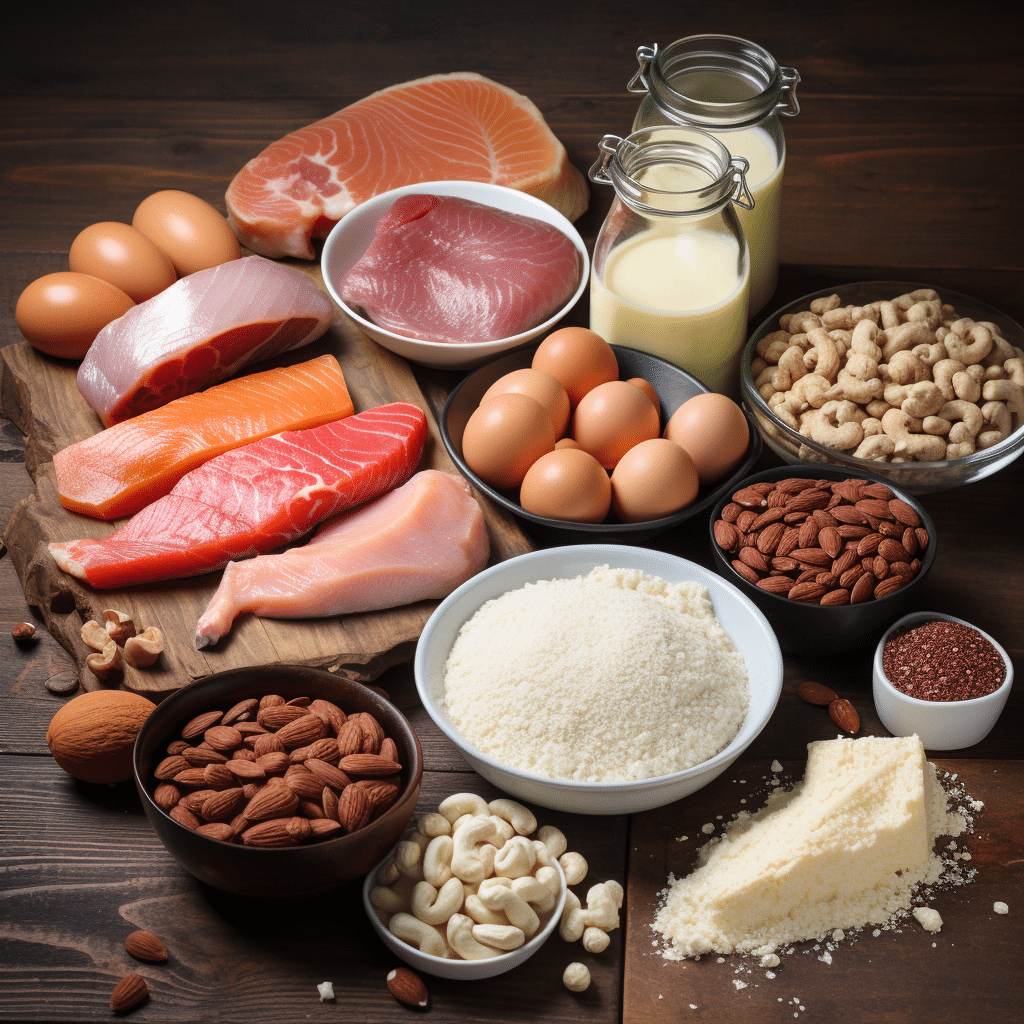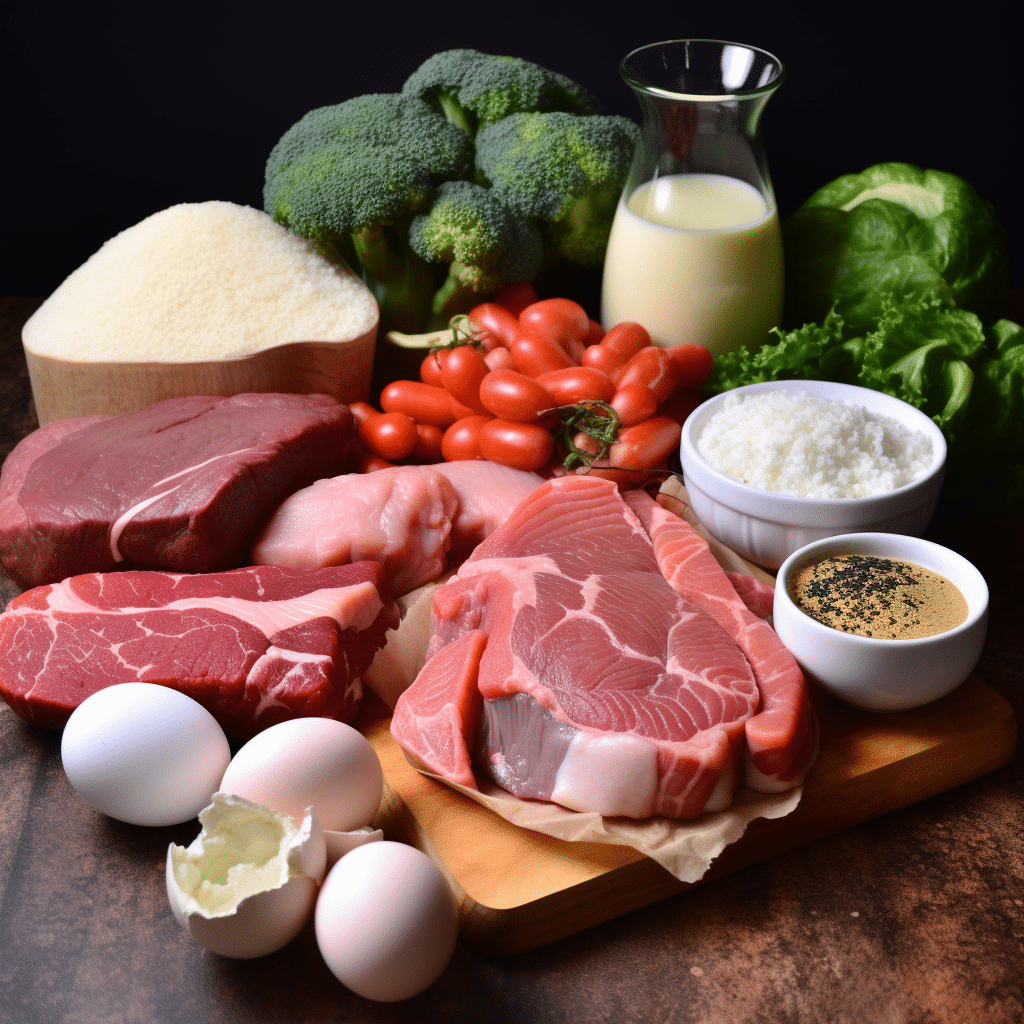When it comes to building muscle, protein is an essential nutrient. It provides the building blocks necessary for muscle repair and growth. But with so many options out there, which protein sources should bodybuilders focus on? I will highlight some of the best protein sources for bodybuilding and muscle building.

Key Takeaways:
- Eggs, Greek yogurt, chicken, and tuna are excellent sources of protein for bodybuilders.
- Lean beef, bison, and soybeans provide essential amino acids for muscle growth.
- Quinoa and peanut butter offer plant-based protein options.
- Cottage cheese and beef jerky are convenient and protein-rich snacks.
- Including a mix of animal-based and plant-based proteins can create a balanced diet for bodybuilders.
High-Protein Meats, Seafood, and Plant-Based Protein Sources
When it comes to building muscle and fueling your body for intense workouts, a high-protein diet is essential. Incorporating a variety of protein sources into your meals can ensure you meet your daily protein needs and promote muscle growth. In this section, we will explore some of the best high-protein meats, seafood, and plant-based options for bodybuilders.

Meat Options
If you’re a meat lover, there are plenty of protein-rich options to choose from. Chicken thighs, lean pork chops, and turkey breast offer around 26 grams of protein per 3-ounce serving. These meats are not only delicious but also provide essential vitamins and minerals that support muscle growth.
Another great option is bison meat, which offers approximately 25 grams of protein per 100 grams. It is leaner than beef and contains all the necessary amino acids for muscle building. Incorporating these meats into your diet can help you meet your protein needs and diversify your meals.
Seafood Choices
Seafood is an excellent source of high-quality protein and essential omega-3 fatty acids. Salmon, shrimp, and tilapia are all great options for bodybuilders. A 3-ounce serving of salmon provides about 17 grams of protein, along with heart-healthy fats. Shrimp, on the other hand, offers 19 grams of protein per serving and is low in calories.
Scallops are another seafood choice that is low in fat and packed with protein, offering around 17 grams per 3-ounce serving. Incorporating seafood into your diet provides a variety of flavors and nutrients that support muscle health and growth.
Plant-Based Protein Sources
For those following a plant-based diet or looking to incorporate more plant-based options into their meals, there are plenty of protein-rich choices available. Beans, such as black beans, pinto beans, and chickpeas offer about 15 grams of protein per cup of cooked beans. They are also high in fiber and provide vitamins and minerals necessary for overall health.
Edamame and tofu are other great plant-based options. Edamame, or immature soybeans, provides approximately 18 grams of protein per cup. Tofu, made from soybeans, contains about 12 grams of protein per 3-ounce serving and can be used in a variety of dishes.
By incorporating high-protein meats, seafood, and plant-based options into your diet, you can ensure that you are meeting your protein needs for muscle growth and recovery. Whether you prefer animal-based or plant-based proteins, there are plenty of delicious and nutritious choices available to support your bodybuilding goals.

Conclusion
It comes to bodybuilding nutrition, incorporating a variety of muscle-building protein sources into your diet is crucial. These protein-rich foods provide the essential amino acids needed for muscle repair and growth, helping you achieve your fitness goals.
From animal-based options like eggs, chicken, fish, and lean meats to plant-based alternatives such as soybeans, quinoa, and beans, there are plenty of top bodybuilding protein sources to choose from. By including a mix of both animal and plant proteins, you can create a well-rounded and sustainable diet that meets your nutritional needs.
Remember, it’s important to consult with a healthcare professional or registered dietitian to develop an individualized nutrition plan tailored to your specific requirements. They can provide guidance on portion sizes, meal timing, and overall protein intake to optimize your muscle-building journey.
So, whether you prefer a steak or a tofu stir-fry, there’s a protein source out there to fuel your bodybuilding ambitions. With the right combination of muscle-building protein sources, you’ll be well on your way to achieving the physique and strength you desire.
FAQ
What are the top bodybuilding protein sources for muscle gain?
The top bodybuilding protein sources for muscle gain include eggs, Greek yogurt, chicken, tuna, lean beef, bison, soybeans and tofu, quinoa, peanut butter, cottage cheese, beef jerky, chicken thighs, salmon, shrimp, lean pork chops, turkey breast, tilapia, beans, protein powders, edamame, scallops, chickpeas, peanuts, and bison.
How much protein do eggs provide?
Eggs contain 6 grams of protein per large egg. They are a versatile protein source and contain nutrients like branched-chain amino acids and omega-3s.
What is the protein content of Greek yogurt?
Greek yogurt provides 23 grams of protein per 8-ounce serving. It is also high in calcium, which is essential for maintaining strong bones and muscles.
How much protein does chicken breast offer?
Chicken breast offers 24 grams of protein per 3-ounce serving. It is low in fat and contains vitamins and minerals like niacin and B6.
How much protein is in tuna?
Chunk light tuna provides 22 grams of protein per 3-ounce serving, while yellowfin tuna offers 25 grams per 3-ounce serving. Tuna is also rich in omega-3 fatty acids.
What is the protein content of lean beef?
Lean cuts of beef such as sirloin and tenderloin provide over 25 grams of protein per 100 grams. Beef is a complete protein source and contains important nutrients like iron and zinc.
How much protein does bison contain?
Bison provides around 25 grams of protein per 100 grams. It is a leaner option compared to beef and contains essential amino acids necessary for muscle building.
What are some plant-based protein sources for bodybuilders?
Plant-based protein sources for bodybuilders include soybeans and tofu, which offer 16 grams of protein per half cup of cooked soybeans and 12 grams of protein per 3 ounces of tofu. Quinoa is also a complete protein source, providing 8 grams of protein per cup.
How much protein does peanut butter have?
Peanut butter offers 8 grams of protein per 2 tablespoons, along with healthy fats. It is a convenient and tasty option to meet protein needs.
What is the protein content of cottage cheese?
Cottage cheese provides 28 grams of protein per cup. It is a protein-packed snack that contains the muscle-building amino acid leucine.
Is Greek yogurt a good high-protein option for bodybuilders?
Yes, Greek yogurt is an excellent high-protein option for bodybuilders. It has approximately double the protein content of regular yogurt and can be consumed anytime. Post-workout or before bed may be beneficial due to its fast- and slow-digesting proteins.
How much protein is in beef jerky?
Beef jerky is a concentrated source of protein and provides a portable snack. It is almost pure protein and can be an easy way to increase protein intake while on the go.
What is the protein content of chicken thighs?
While slightly higher in fat compared to chicken breast, chicken thighs still offer about 26 grams of protein per 3-ounce serving. They are also rich in vitamins and minerals like niacin, iron, and zinc.
How much protein does salmon contain?
Salmon is a protein-rich fish that provides about 17 grams of protein per 3-ounce serving. It also contains essential omega-3 fatty acids, which support muscle health.
How much protein is in shrimp?
Shrimp is a low-calorie and protein-packed seafood option, offering 19 grams of protein per 3-ounce serving. It is also a good source of vitamin A and several B vitamins.
What is the protein content of lean pork chops?
Lean pork chops offer about 26 grams of protein per cooked 3-ounce serving. They are also a good source of various vitamins and minerals, including thiamin, niacin, and zinc.
How much protein does turkey breast provide?
Turkey breast is a lean source of protein, providing around 26 grams per 3-ounce serving. It contains essential B vitamins and is low in fat and carbs.
What is the protein content of tilapia?
Tilapia, a protein-rich seafood option, provides about 23 grams of protein per 3-ounce fillet. While lower in omega-3 fatty acids compared to salmon, it is still a nutritious choice.
How much protein do beans offer?
Various types of beans such as black, pinto, and kidney beans contain about 15 grams of protein per cup of cooked beans. They are also high in fiber, B vitamins, and minerals like magnesium and iron.
Are protein powders beneficial for bodybuilders?
Yes, protein powders such as whey, casein, soy, and pea protein can be beneficial for bodybuilders who have difficulty meeting their protein needs through whole foods alone. They are a convenient way to increase protein intake.
What is the protein content of edamame?
Edamame, or immature soybeans, is a protein-rich plant-based option. It offers about 18 grams of protein per cup, along with important nutrients like folate and manganese.
How much protein do scallops contain?
Scallops are a low-fat and protein-dense seafood choice, providing about 17 grams of protein per 3-ounce serving. They are also a source of vitamins B12 and selenium.
What is the protein content of chickpeas?
Chickpeas, also known as garbanzo beans, offer about 15 grams of protein per cup of cooked beans. They are also high in fiber and a variety of vitamins and minerals.
How much protein do peanuts provide?
Peanuts provide 7 grams of protein per ounce. They are also a good source of the amino acid leucine.
What is the protein content of bison meat?
Bison meat, similar to beef, offers around 25 grams of protein per 100 grams. It is a leaner option compared to beef and contains essential amino acids necessary for muscle growth.
Source Links
- https://www.bodybuilding.com/content/ultimate-list-40-high-protein-foods.html
- https://www.healthline.com/nutrition/26-muscle-building-foods
- https://www.strengthlog.com/best-protein-foods-for-muscle-growth/

